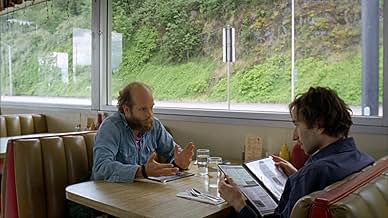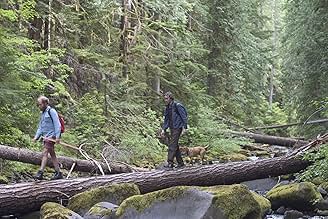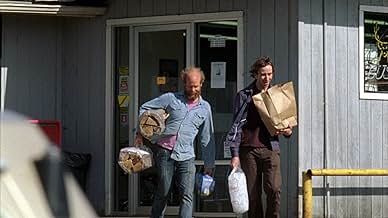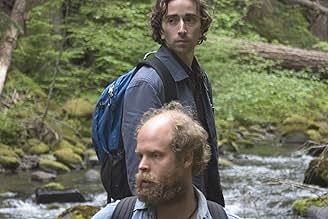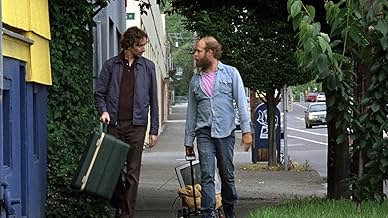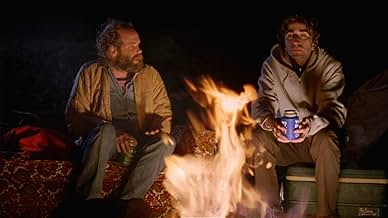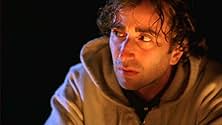Old Joy
- 2006
- Tous publics
- 1h 16m
IMDb RATING
6.8/10
9.4K
YOUR RATING
Two old pals reunite for a camping trip in Oregon's Cascade Mountains.Two old pals reunite for a camping trip in Oregon's Cascade Mountains.Two old pals reunite for a camping trip in Oregon's Cascade Mountains.
- Director
- Writers
- Stars
- Awards
- 5 wins & 5 nominations total
- Director
- Writers
- All cast & crew
- Production, box office & more at IMDbPro
Featured reviews
which is exactly what this film is supposed to be. Boring? Not a chance, unless of course you're a fan of what film has unfortunately become; chaotic cross cuts of meaningless images.
The soundtrack, the acting, the direction and scenery all add to this beautiful, intimate story about two friends trying to find solace in this chaos we call life.
Too many films today think high powered story lines, which generally equal meaningless dialogue make for an interesting film, which couldn't be farther from the truth.
It's about time we let film be film by allowing the images to tell the story.
Don't miss it. This is a nice, rare gem.
The soundtrack, the acting, the direction and scenery all add to this beautiful, intimate story about two friends trying to find solace in this chaos we call life.
Too many films today think high powered story lines, which generally equal meaningless dialogue make for an interesting film, which couldn't be farther from the truth.
It's about time we let film be film by allowing the images to tell the story.
Don't miss it. This is a nice, rare gem.
Such a quiet little film, short at just 73 minutes, understated in its direction, and without any grand revelations or events in its plot. The scenery of Oregon that we see from the car and then in the forest is beautiful and evocative, really making me want to get back up there and do some hiking, which made seeing this worth it all on its own. I probably would have liked just a teeny bit more from the script, but the restraint is intentional, and with the barest of brush strokes Kelly Reichardt paints this picture of two friends slowly drifting apart in life that was sad and stirring. One has a wife and is soon to be a father, and the other is nice enough but hasn't gotten on track, smoking a lot of pot and getting the two of them lost. The first guy assures the second that they're still solid friends, but the latter feels him moving on, in part because of his own struggles, and goes so far as to give him an awkward back rub at the hot springs as if to force a level of intimacy that the two don't really have anymore. On the way back there are few words, just passing images out the window at night that fit the melancholy of the film perfectly, and I got the sense that despite what they say about calling one another, it may be years before they ever see each other again, if ever. Moving on in life is sometimes inevitable, but there's an extra sense of sadness here because one of the two is a bit lost, a situation which really hit home for me personally because of a friend I once knew (a guy who never made it past being lost). Reichardt puts in a few other nice touches in the talk radio clips we hear, reflecting issues in American politics and life still relevant today. Really, just a lovely little film, and a near miss for a higher rating.
In my mind, there are 2 ways to fully understand this film and it all depends which character relates to your own life the most. And that is as simple as it gets.
1. you're a "Mark". The friend that has matured, has a career & a family, left his carefree overindulgent days behind them and who doesn't have enough time for the friendships you once had.
2. you're a "Kurt". The friend who hasn't figured out what they want to do with their life just yet, living very sparsely, still doing the same irresponsible things they were in their twenties and really can't grasp that their friend they used to be really close to has other responsibilities.
On that basis alone, the "Marks" tend to appreciate the film more, while the "Kurts" tend to dismiss it rather quickly. Speaking from experience, the film hit a little too vlose to home. But as a "recovering Kurt", it was an absolute eye-opener. So I'm definitely in the minority by saying this film touched me in a profound way and made me really take a look at my own closest friendships. I can't think of another film that has made me do that. And all the while being the simplest of stories. Bravo.
1. you're a "Mark". The friend that has matured, has a career & a family, left his carefree overindulgent days behind them and who doesn't have enough time for the friendships you once had.
2. you're a "Kurt". The friend who hasn't figured out what they want to do with their life just yet, living very sparsely, still doing the same irresponsible things they were in their twenties and really can't grasp that their friend they used to be really close to has other responsibilities.
On that basis alone, the "Marks" tend to appreciate the film more, while the "Kurts" tend to dismiss it rather quickly. Speaking from experience, the film hit a little too vlose to home. But as a "recovering Kurt", it was an absolute eye-opener. So I'm definitely in the minority by saying this film touched me in a profound way and made me really take a look at my own closest friendships. I can't think of another film that has made me do that. And all the while being the simplest of stories. Bravo.
This is a movie where nothing at all happens. Surprisingly that's not a really bad thing. It is the story of a short dull road trip between two old friends. Two old friends that have nothing to say to each other.
Even though this movie is only about 70 minutes long, there is a still lot of filler. The filler is pretty and quiet in a mellow sort of way. Yo La Tengo's sparse soundtrack goes perfect with the lack of dialog and lack of action. Somehow it actually sort of works.
But I got a real sense of missed opportunity with this film. The filmmaker seems to have nothing to say. While amazingly well executed, there is no real depth to this film. Maybe that's the point. Even if, it felt like it needed more.
It is a nice film to watch if you find yourself in a mellow mood. It's like watching the scenery go by from a train. If you feel like a train ride, this is a pleasant one.
Even though this movie is only about 70 minutes long, there is a still lot of filler. The filler is pretty and quiet in a mellow sort of way. Yo La Tengo's sparse soundtrack goes perfect with the lack of dialog and lack of action. Somehow it actually sort of works.
But I got a real sense of missed opportunity with this film. The filmmaker seems to have nothing to say. While amazingly well executed, there is no real depth to this film. Maybe that's the point. Even if, it felt like it needed more.
It is a nice film to watch if you find yourself in a mellow mood. It's like watching the scenery go by from a train. If you feel like a train ride, this is a pleasant one.
Two friends in their early thirties meet to renew their previous friendship on a camping trip in the gorgeous Cascade Mountains of Oregon. Kurt (Will Oldham) is a balding free spirit, while Mark (Daniel London) is a working man who is about to take on the responsibility of being a father. Both men seek to recreate the magic that once brought them together but their connection is now so tenuous and their worlds so divided that it seems as if there is no longer anything to hold onto, even memory.
Kelly Reichardt's superb Old Joy is a film of rare beauty unburdened by typical male-bonding clichés, more the "big chill out" than The Big Chill. While it is the story of male friendship, it is not about plot or even character but a film of mood and atmosphere that tells its story with gestures, expressions, and silences punctuated by the ambient sounds of nature. On their drive through pristine countryside to the music of Yo La Tengo, Mark listens to Air America talk radio bemoaning the state of the Democratic Party and talks about how his father decided to leave his mother when he turned seventy but nothing is said about what the two shared together in the past.
When Kurt fails to find the turnoff to the Bagby Hot Springs near Oregon's Mount Hood, the two (three if you include the dog) spend the night at an abandoned campsite, prompting Kurt to remark that "there are trees in the city, and garbage in the forest, so what is the difference?" At the campsite, Kurt relates his experiences of recent trips to Big Sur and Ashland which he calls "transcendent" and "life-changing" and about how he took a course in physics but knew more than the professor and volunteers his theory that the universe is enclosed in a tear that is falling and has been for millennia, but Mark seems to hardly notice.
He only perks up when he receives phone calls on his cell from his pregnant wife (Tanya Smith) who had only given grudging consent to the trip, sensing that the pot smoking Kurt was not a good influence. The next day they reach the springs and enjoy a moment of peace in the hot tub but it is interrupted by Kurt's telling Mark how much he misses him and how something is wrong with their relationship which Mark denies but the sense is that something has been lost forever.
Nothing really happens in Old Joy. There are almost no peak dramatic moments but almost every scene has subtle undertones of meaning. A sense of loss permeates the film, the loss perhaps of a time when people were connected and fighting for a cause meant human involvement rather than the distancing of today's radio talk shows or anonymous Internet message boards. When the aging hippie shares a Chinese proverb that "Sorrow is nothing but worn out joy", it feels as if the film becomes a metaphor for the joy that seems to be wearing out in an age approaching its zero point.
Kelly Reichardt's superb Old Joy is a film of rare beauty unburdened by typical male-bonding clichés, more the "big chill out" than The Big Chill. While it is the story of male friendship, it is not about plot or even character but a film of mood and atmosphere that tells its story with gestures, expressions, and silences punctuated by the ambient sounds of nature. On their drive through pristine countryside to the music of Yo La Tengo, Mark listens to Air America talk radio bemoaning the state of the Democratic Party and talks about how his father decided to leave his mother when he turned seventy but nothing is said about what the two shared together in the past.
When Kurt fails to find the turnoff to the Bagby Hot Springs near Oregon's Mount Hood, the two (three if you include the dog) spend the night at an abandoned campsite, prompting Kurt to remark that "there are trees in the city, and garbage in the forest, so what is the difference?" At the campsite, Kurt relates his experiences of recent trips to Big Sur and Ashland which he calls "transcendent" and "life-changing" and about how he took a course in physics but knew more than the professor and volunteers his theory that the universe is enclosed in a tear that is falling and has been for millennia, but Mark seems to hardly notice.
He only perks up when he receives phone calls on his cell from his pregnant wife (Tanya Smith) who had only given grudging consent to the trip, sensing that the pot smoking Kurt was not a good influence. The next day they reach the springs and enjoy a moment of peace in the hot tub but it is interrupted by Kurt's telling Mark how much he misses him and how something is wrong with their relationship which Mark denies but the sense is that something has been lost forever.
Nothing really happens in Old Joy. There are almost no peak dramatic moments but almost every scene has subtle undertones of meaning. A sense of loss permeates the film, the loss perhaps of a time when people were connected and fighting for a cause meant human involvement rather than the distancing of today's radio talk shows or anonymous Internet message boards. When the aging hippie shares a Chinese proverb that "Sorrow is nothing but worn out joy", it feels as if the film becomes a metaphor for the joy that seems to be wearing out in an age approaching its zero point.
Did you know
- TriviaThe dog's real name is Lucy. She also played the dog Lucy in Wendy et Lucy (2008) - a film also directed by Kelly Reichardt from a story written by Jon Raymond.
- GoofsThe birds singing at the hot springs are native to the Eastern U.S., not Oregon. According to Director Kelly Reichardt, she unknowingly mixed the audio for this scene with a stock recording of forest ambiance, and a birder pointed this error out to her at a Q&A for the film.
- Crazy creditsA disclaimer says that the Bagby Hot Springs does not allow nudity or the consumption of alcoholic beverages.
- ConnectionsFeatured in What Is Cinema? (2013)
- How long is Old Joy?Powered by Alexa
Details
- Release date
- Country of origin
- Official site
- Language
- Also known as
- Viejas alegrías
- Filming locations
- Production companies
- See more company credits at IMDbPro
Box office
- Budget
- $30,000 (estimated)
- Gross US & Canada
- $255,923
- Opening weekend US & Canada
- $3,310
- Aug 27, 2006
- Gross worldwide
- $301,440
Contribute to this page
Suggest an edit or add missing content


